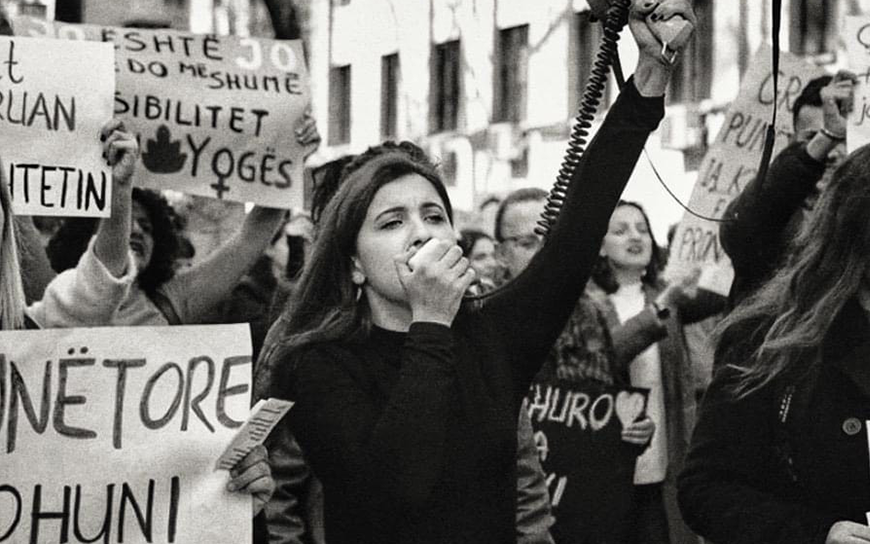
“I realised you cannot live in fear. You need to speak up, because there is no life without freedom,” says Gresa Hasa, the Albanian feminist activist, recalling the day in 2011 when four demonstrators were killed during a protest in front of the Prime Minister’s office in Tirana.
At the time Gresa was a political science student in Albania’s capital. She soon became engaged in the student movement Për Universitetin (‘For the University’) and in 2018-2019 she was one of the leaders of mass students’ protests against reform in higher education. These large-scale demonstrations, the biggest grassroot protests in 30 years of democracy in Albania, forced the Prime Minister to dismiss the Minister of Education as well as half of the government, scrap the planned increase of tuition fees in public universities for at least one year, and take immediate measures to reconstruct university buildings.
For almost a decade, Gresa has been speaking up about the marginalisation of women in the very patriarchal public space of Albania. She is now a regular face at street protests and on television talk shows.
“In Albania we never had a feminist movement. We never had a sexual revolution, mainly because of our dictatorial past. However, no matter how challenging it is to work in the current environment, it is not impossible to organise. Gender issues cannot be ignored when talking about human rights, democracy or freedom of speech. Everything is interconnected. There is no future for Albania without the inclusion of women, LGBTQI+ individuals and the Roma and Egyptian minorities. We are here and we demand justice and respect.”
Building feminist spaces in Albania
With EED’s funding, Gresa has made sure that the feminist collective she is a part of, as well as marginalised communities, can gather in a physical safe space. Shtëpia Publike (‘The Public House’) holds regular events, from activist meetings to film and literature evenings, to discussions on gender and minorities’ rights. Every topic is viewed and deconstructed through the feminist lens.
The space has also become an educational hub where students and activists have access to feminist texts, movies, and other resources. “Students are not taught about social issues and human rights at school, so we try to further their education on these topics through interactive participation,” she says.
Gresa and fellow activist Liri Kuçi, also founded Shota, Albania’s first feminist magazine, a bi-annual production with theoretical and opinion pieces, translations, interviews, and creative literature pieces, with a section in English as a way to build bridges with other feminist activists abroad, especially in the region.
“The Balkans are poisoned by nationalism, which is a patriarchal ideology. In our region we have learned this the hard way. And violence against women anywhere is a pressing issue everywhere”, explains Gresa.
The magazine is also a teaching instrument for students: “For many it’s the first time they come across a feminist point of view,” she says, noting that the next issue of Shota will look at war from a feminist perspective, focusing on the Balkans in the 1990s and on the war in Ukraine today.
A more equal society for new generations
Gresa explains that her vision of Albania is one where girls and women, the LGBTQI+ community, and the Roma and Egyptian minorities live with no fear and can take part in decision-making processes.
In 2020 she and other feminist activists organised mass protests in nine Albanian cities after the gang rape of a 14-year-old girl. “We travelled to the girl’s hometown to demand justice and show solidarity to her and her family by being loud. We decided to be physically present in this patriarchal town, where the public space is very male-dominated. We gathered activists and other supporters from different cities, got on buses and made sure that the entire Albania heard us.”
Gresa admits that it’s difficult for Albanian women to advocate for their place in society, and those who do face repercussions. She has received online hate, rape threats, and was even summoned to the Prosecutor’s Office for her political Facebook posts. She was once fired for her activism, and in interviews, prospective employers have informed her that her presence would be a ‘disturbance’ in the workplace.
“There are times when I feel burnt out, and I tell myself I cannot do this anymore,” she says. “I have had to learn to be less affected by all the threats, but that’s not to say that I ever accept this situation.”
Asked about her dream for the future, she talks about a future Albania where every little girl can feel that the public space belongs to her as much as it belongs to any man.
“Maybe we will not make a revolution, but we are doing our best to build a better, more equal, and more democratic society. To leave something behind for those who come after us. It’s a slow process, but more and more young women, some of them still in high school, are coming to our protests. They’re rebellious, outspoken, and fearless. This new generation gives me hope.”
This article reflects the views of the grantee featured and does not necessarily represent the official opinion of the European Endowment for Democracy, the European Commission or any other European State or other contributors to EED.